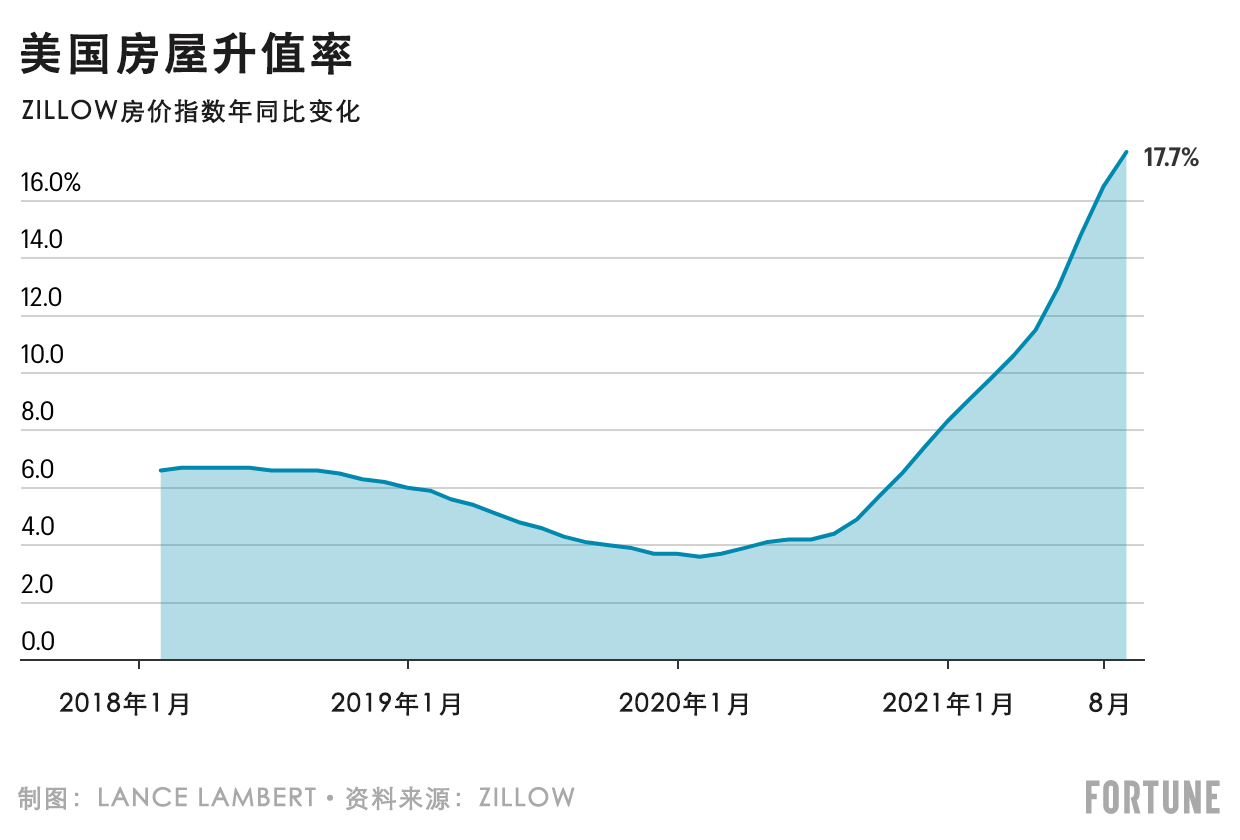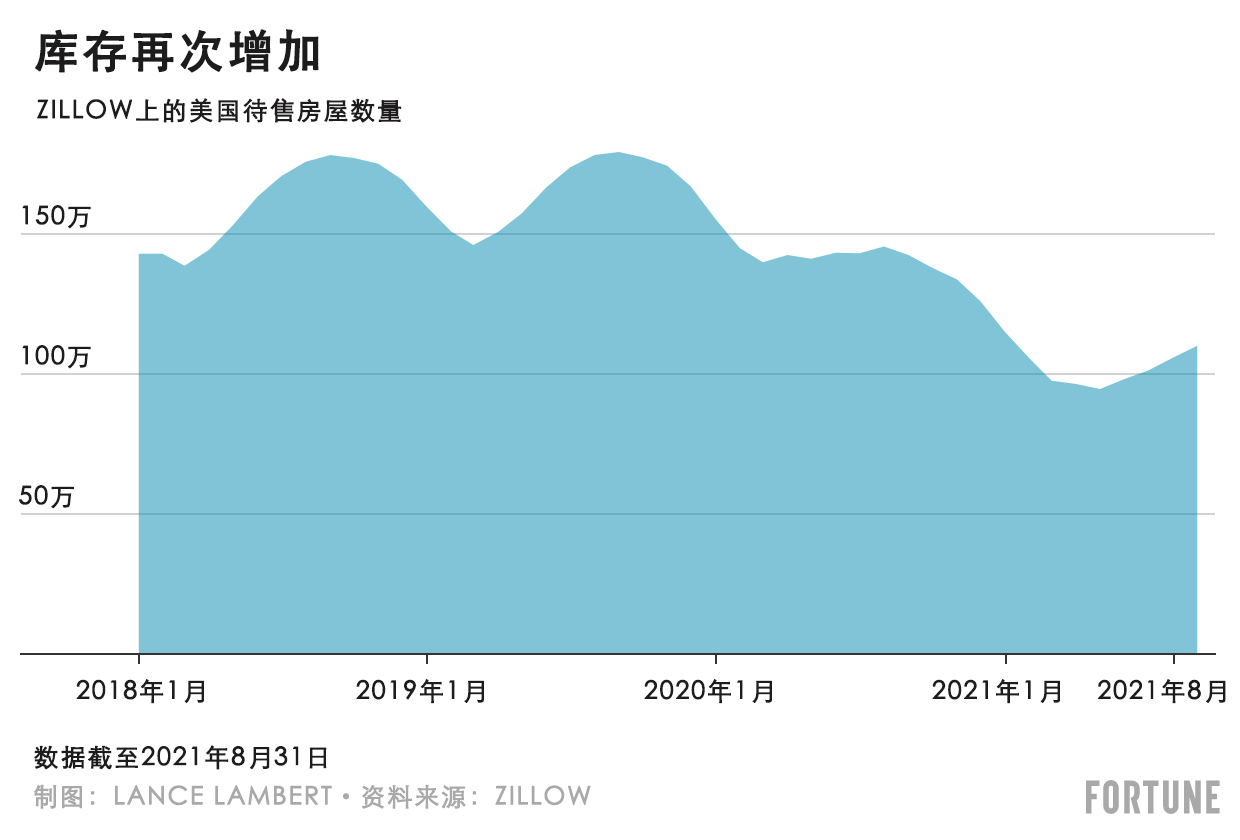预测:美国房价明年还会涨
App摘要:虽然美国房地产市场依旧是卖方市场,但情况显然稍有改变。有更多住房挂牌上市,但竞购战的数量却大幅减少。尽管如此,Zillow的预测模型显示,购房人不应该指望会出现价格回调。
虽然美国房地产市场依旧是卖方市场,但情况显然稍有改变。有更多住房挂牌上市,但竞购战的数量却大幅减少。
尽管如此,Zillow的预测模型显示,购房人不应该指望会出现价格回调。
在线房地产交易平台Zillow预测,未来12个月,美国房价将上涨11.7%。虽然涨价的速度有所减慢(过去12个月,普通住房的房价上涨了17.7%),但买不起房的购房人并不会因此感到安心。毕竟,尽管目前就业市场火爆,但大部分工作者明年不会有机会加薪11%。
Zillow经济学家克里斯·格林告诉《财富》杂志:“房价上涨很难预测,但我们预计房价的上涨速度较历史最高水平会有所放缓。” Zillow形容房地产市场只是从“白热化”变成了“火爆”。

为什么Zillow预测房价会继续上涨?格林认为原因是“依旧供不应求”。
正如《财富》之前所报道的那样,在当前这五年,绝大多数千禧一代(1989年至1993年出生)将进入30岁,大部分人在这个年龄段会开始买房。市场并没有为千禧一代购房者的大量增加做好准备:经过十年房地产危机之后,建筑商在2010年之后的十年间变得小心翼翼。据房利美(Freddie Mac)统计,这导致美国存在约400万套房屋缺口。
不止于此:新冠疫情对房地产市场产生了影响,例如经济衰退导致的低抵押贷款利率,而居家办公趋势令购房人可以深入郊区寻找目标,这些影响仍未消失,并使房地产市场持续火爆。虽然房屋库存再次增加,但依旧远低于疫情之前的水平,并且无法满足当前的需求。这意味着房价会继续上涨。

这一点毫无疑问:Zillow的预测非常乐观。但依旧高于其他房地产公司的预测。CoreLogic预测,未来12个月,美国房价仅会上涨2.2%。约翰·伯恩斯房地产咨询公司(John Burns Real Estate Consulting)和房利美预测,2022日历年的房价涨幅分别为4%和5.3%。
我们还是要强调预测房价上涨的难度。在疫情之初,CoreLogic预测2020年4月至2021年4月房价将下跌1.3%。当时个别州曾临时禁止现场看房,而且失业率上升到接近15%。Zillow预测同期房价将下跌2%至3%。当然,他们的预测与实际情况相去甚远:在新冠疫情期间,美国经历了史上最紧张、竞争最激烈的房地产市场。(财富中文网)
翻译:刘进龙
审校:汪皓
App摘要:虽然美国房地产市场依旧是卖方市场,但情况显然稍有改变。有更多住房挂牌上市,但竞购战的数量却大幅减少。尽管如此,Zillow的预测模型显示,购房人不应该指望会出现价格回调。
虽然美国房地产市场依旧是卖方市场,但情况显然稍有改变。有更多住房挂牌上市,但竞购战的数量却大幅减少。
尽管如此,Zillow的预测模型显示,购房人不应该指望会出现价格回调。
在线房地产交易平台Zillow预测,未来12个月,美国房价将上涨11.7%。虽然涨价的速度有所减慢(过去12个月,普通住房的房价上涨了17.7%),但买不起房的购房人并不会因此感到安心。毕竟,尽管目前就业市场火爆,但大部分工作者明年不会有机会加薪11%。
Zillow经济学家克里斯·格林告诉《财富》杂志:“房价上涨很难预测,但我们预计房价的上涨速度较历史最高水平会有所放缓。” Zillow形容房地产市场只是从“白热化”变成了“火爆”。
为什么Zillow预测房价会继续上涨?格林认为原因是“依旧供不应求”。
正如《财富》之前所报道的那样,在当前这五年,绝大多数千禧一代(1989年至1993年出生)将进入30岁,大部分人在这个年龄段会开始买房。市场并没有为千禧一代购房者的大量增加做好准备:经过十年房地产危机之后,建筑商在2010年之后的十年间变得小心翼翼。据房利美(Freddie Mac)统计,这导致美国存在约400万套房屋缺口。
不止于此:新冠疫情对房地产市场产生了影响,例如经济衰退导致的低抵押贷款利率,而居家办公趋势令购房人可以深入郊区寻找目标,这些影响仍未消失,并使房地产市场持续火爆。虽然房屋库存再次增加,但依旧远低于疫情之前的水平,并且无法满足当前的需求。这意味着房价会继续上涨。
这一点毫无疑问:Zillow的预测非常乐观。但依旧高于其他房地产公司的预测。CoreLogic预测,未来12个月,美国房价仅会上涨2.2%。约翰·伯恩斯房地产咨询公司(John Burns Real Estate Consulting)和房利美预测,2022日历年的房价涨幅分别为4%和5.3%。
我们还是要强调预测房价上涨的难度。在疫情之初,CoreLogic预测2020年4月至2021年4月房价将下跌1.3%。当时个别州曾临时禁止现场看房,而且失业率上升到接近15%。Zillow预测同期房价将下跌2%至3%。当然,他们的预测与实际情况相去甚远:在新冠疫情期间,美国经历了史上最紧张、竞争最激烈的房地产市场。(财富中文网)
翻译:刘进龙
审校:汪皓
While the housing market is still very much a seller’s market, things are clearly shifting a bit. More homes are coming on the market, and we’ve seen a big decline in the number of bidding wars.
That said, buyers shouldn’t pencil in a price correction, according to Zillow’s forecast model.
Over the next 12 months, Zillow, an online real estate marketplace, is forecasting an 11.7% appreciation in U.S. home values. While that would mark a slowdown in appreciation—over the past 12 months the typical home has increased 17.7% in value—it would hardly be a relief for priced-out homebuyers. After all, even in this strong labor market, most workers won’t get anything close to an 11% raise next year.
“Home price appreciation is difficult to forecast, but we expect home price growth to slow down from historic highs,” Chris Glynn, an economist at Zillow, tells Fortune. Zillow describes the housing market as transitioning from “white hot” to just “red hot.”
Why does Zillow expect home prices to continue rising? Glynn points to “demand still outpacing supply.”
As Fortune has previously reported, we’re in the middle of the five-year period during which the largest chunk of millennials, those born between 1989 and 1993, are hitting their thirties—the age when first-time homebuying really kicks into gear. The market just wasn’t ready for this influx: After the aughts housing crisis, builders played it safe during the 2010 decade. As a result, the nation is under-built by around 4 million homes, according to Freddie Mac.
That’s not all: The effects of COVID-19 on the housing market—recession-induced low mortgage rates coupled with the work-from-home trend allowing buyers to search deeper into the burbs—are still at play and driving the housing market forward. While inventory is rising again, it’s still well below pre-pandemic levels and simply unable to meet the current demand. Cue higher prices.
There’s no doubt about it: This forecast by Zillow is very bullish. But it’s also a bit of an outlier when compared with other real estate firms’ outlooks. Over the coming 12 months, CoreLogic forecasts only a 2.2% jump in U.S. home prices. For the 2022 calendar year, John Burns Real Estate Consulting and Freddie Mac are forecasting home price growth of 4% and 5.3%, respectively.
We should also emphasize how hard it is to forecast home price growth. At the onset of the pandemic—which saw some states temporarily ban in-person real estate viewings while the unemployment rate soared to nearly 15%—CoreLogic forecast that between April 2020 and April 2021 home prices would fall 1.3%. For that same period, Zillow forecast that prices would fall 2% to 3%. Of course, they weren’t even close: The housing market during the COVID-19 pandemic has been among the tightest and most competitive in U.S. history.













